Text
You know CRWBY, I really buy that you thought out Ironwood’s Semblance and totally didn’t slap it together after Volume 7 when Ironwood’s own voice actor admits in public “Yeah I only learned he had a Semblance when a fan told me.” Especially when said VA is in freqent contact with your writing team.
(Jason Rose did a RWBY panel with some other cast members on the 9th of January where Arryn asked what Ironwood’s Semblance was, for context)
Then again I thought it was slapped together when after explaining Mettle, Miles then gave an incorrect example of it in effect and Eddy had to backtrack on it less than two days later so thanks for the confirmation.
76 notes
·
View notes
Photo



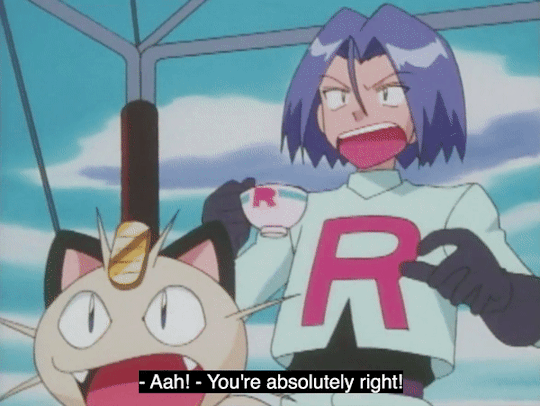
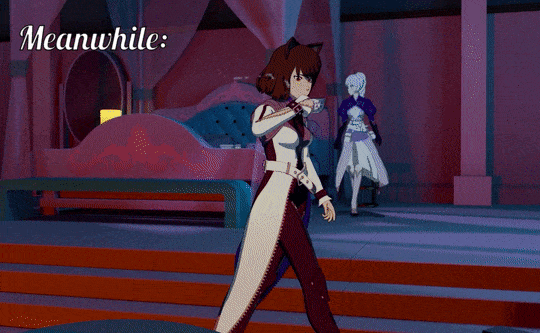
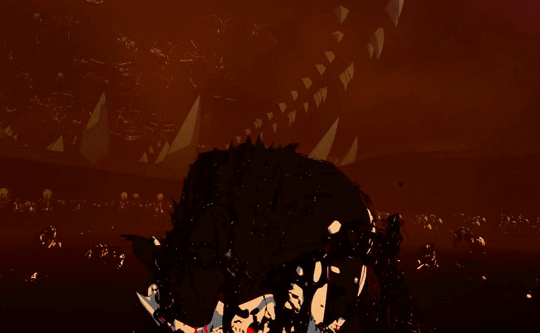

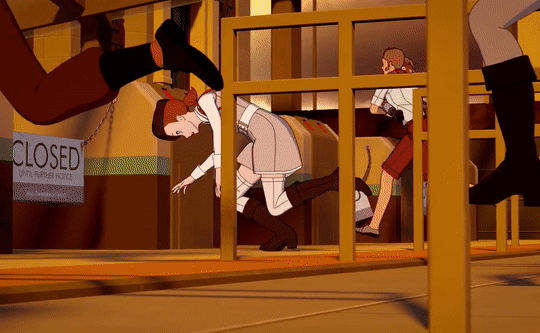
Team Rocket VS Team Rwby
19 notes
·
View notes
Text
I know she’s injured, but Queen has never looked better.

Fanart of Winter's design for Volume 8 by Ombre_t on Pixiv.
920 notes
·
View notes
Photo
that’s some good content
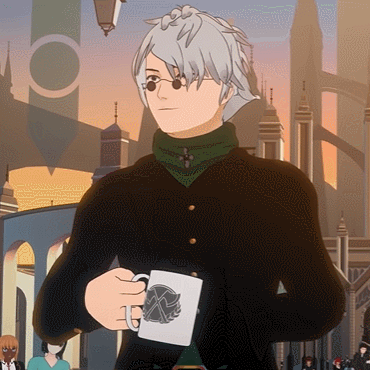
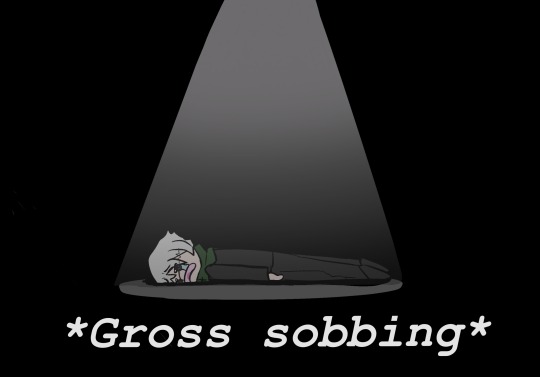

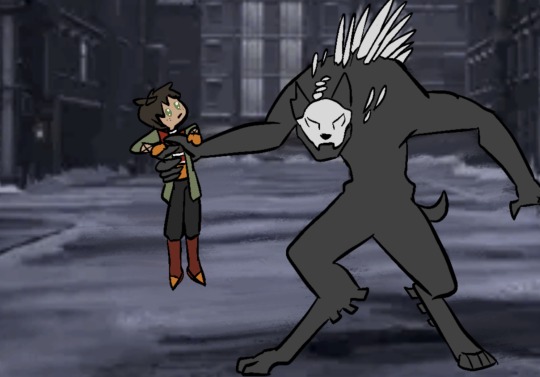


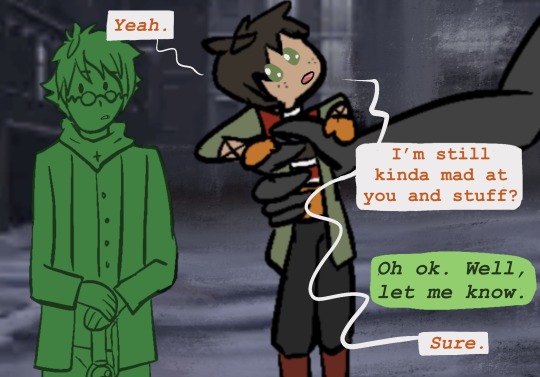


I’m sorry this was funnier in my head and the attack was a lot more vicious I’m just a lazy artist and dont feel like drawin the whole thing out but like…
W-what was Ozpin even doing during those, like, 45 seconds Oscar was getting mauled?
2K notes
·
View notes
Text
Vol. 6 - Dissection of Storytelling and Character
This will be the first in a series of posts analyzing the writing in RWBY from Volume 6 onward.
Disclaimer: This is not a hate-filled dumpster-fire rant or an analysis of the creators as people. I will be sticking to pure criticism of the writing and characters based on my own knowledge of good storytelling techniques and writing effective plots, conflicts, character arcs, etc. I have scrolled through plenty of comments on RoosterTeeth in which people harass anyone criticizing the show. In the words of one of such commenter: “You are beyond entitled.” The problem with this, of course, is that art is open to interpretation. Someone liking RWBY makes them no more or less entitled than I am for disliking it. Others have argued that “if you don’t like the show then don’t watch it.” My response to that is: If you do not like reading criticism of RWBY then do not read onward from this point.
Truthfully, I’m not sharing my thoughts here with the intent of making others hate the show. Not everyone likes or needs to critically analyze a show they are watching for fun. I am simply one of those people that does and I also needed an outlet to organize my thoughts and frustrations after Volume 7 as well as starting a discourse with others. And I can understand when people are upset at others for bringing negativity to a space meant for enjoyment, but by responding hatefully you only breed the very negativity you were trying to prevent. And not all criticism should be looked at negatively. Compliments are vital, but it’s not of benefit to nod along and feign approval to appease others when you don’t mean it. Closing ourselves off from criticism means closing ourselves off from opportunities to change, grow, and improve.
Introduction
I’ve seen many videos and posts already addressing issues they had with the show, problems ranging from animation and character design to the budgeting and studio. I want to clarify that in this post I will be talking almost exclusively about the writing and characters, mainly for two reasons. Firstly, the writing and characters were what originally drew me to the show and also what disappointed me later on. Secondly, while there are numerous financial reasons why the quality of fight animation and character designs as well as episode length can decline that are not necessarily the fault of the creative heads, the writing is. A good story or even a story with consistency does not cost money, it merely requires intelligence in creative thinking and methods of storytelling. Writers need even a basic understanding of planting and payoff, structure, consistency, tropes, symbols, metaphors, subtext, and subverting expectations in order to execute a story competently. And that is where Volumes 6 and 7 failed in my opinion, especially in comparison to earlier seasons. The problems I had with the series were not external factors beyond the control of the show’s team, so regardless of budgetary constraints or internal studio issues, RWBY could still have had good writing and that is what makes this decline in the series particularly disappointing.
The major writing-related issue that underpins most of the other issues is the change from characters who were complex and had nuanced interactions in earlier seasons to characters that are now increasingly simplistic and inconsistent. This analysis will be primarily examining three episodes in Volume 6, as they are particularly relevant to the discussion of this issue.
Aspects I Felt Were Effective
I want to begin on a positive note by listing the aspects of Volume 6 I liked and considered the season’s strong points:
1. The opening theme was enjoyable and its visuals intriguing (if a bit misleading: the placement of characters in some shots makes it seem as though Weiss is going to be particularly important this Volume, etc.). The lyrics of this song flowed quite seamlessly and accompanied the visuals well.
2. Salem’s backstory provided some much needed answers to the mysteries the series sets up in earlier seasons and is presented in an interesting way. The series has often refrained from using flashbacks before, instead having characters talk about events that happened, which often violated the ‘show don’t tell’ rule. So it was a visually-stimulating choice to see all of Ozpin’s backstory for ourselves. And it was also, I think, a good choice to have the main characters be present in those scenes but only as observers in the room. With respect to the content of the flashback, it considerably increased the stakes to include all of humanity; and it also gave Ozpin’s character more concrete characterization rather than continuing to have him be a mysterious, wise mentor figure. In terms of themes, the backstory plays nicely off the motif of all legends having some truth to their origin that is present throughout the show.
3. Maria was an interesting addition to the crew with a compelling past. I really enjoyed the flashback with her as well, since her fighting method was clever and unconventional. It is also nice to finally pay off on the mystery surrounding silver-eyed warriors and give context to their abilities through a character who was hunted for having them.
4. The concept of the Apathy and that episode, in general, was extremely interesting. Not only does the Apathy set up a great horror episode, the way it is slowly revealed (almost like a locked room mystery) keeps a constant suspense and then terror when the final reveal is made. It also comes at a great point in the story in terms of character arcs. The main cast was hopeless and despondent after learning about Ozpin’s past and in this episode we get a literal personification of their apathy and how truly horrifying it is to lose hope, to not care. An incredibly intriguing concept with solid execution.
5. The moment when Jaune sees Pyrrha’s statue was quite poignant. It was a scene that properly touched on the sadness of Pyrrha’s death and not only brought out audience reaction but addressed Jaune’s emotions as well. The writers handled his survivor’s guilt, his sorrow, his hopelessness wonderfully. And it also organically worked through his healing process. Having Ren and Nora be the ones to tell him that they need him rather than someone from Team RWBY made much more sense and was a great choice by the writers.
Volume 6 Episode 2: Uncovered
The steep decline in character writing, particularly for Team RWBY, began after the train crash when Team RWBY, Qrow, Oscar, and Maria are stranded on the snowy mountainside in the wreckage of their traincar. Yang almost immediately starts yelling at Ozpin: “What happened to no more lies and half-truths?” Weiss joins in, saying: “Well you certainly didn’t tell us everything about the relic.” The anger they direct at Ozpin would be more consistent with their earlier characterization if they emphasized how the train passengers were put in danger due to the relic attracting Grimm. During their time at Beacon Academy they learn and come to respect that the true value of a Huntress is in protecting others and that their own desires come second (Volume 2, Chapter 10). However, no one brings up this point in the entire discussion. Their dialogue centers around their own desire to be given all of Ozpin’s knowledge and secrets. Their anger stems from feeling left out, in a sense. And this is the seed of Team RWBY making things about themselves that grows into a giant oak through the rest of the show.
Ozpin states that he did not want to bring on negative emotions by telling them and this is a relatively logical argument since the Huntsmen and Huntresses on the train could fight off the Grimm, but if Team RWBY and the others were made anxious or angry by the information it would both attract more Grimm and make it difficult for them to focus on fighting. Weiss responds to Ozpin with, “I’m getting real tired of people choosing what’s best for me.” This comment might have been even a little bit impactful if Weiss had done anything besides complain about having to go back to Atlas since it was agreed that they would. The way Weiss, and by extension Team RWBY, handle the information about Salem and her war against the whole world makes an excellent case for why people should choose what’s best for them.
Predictably enough, I think this problem arises from the stakes being raised too high due to the revelations made in Volumes 4-6 about Salem. It feels as though the writers wanted to expand the lore and darken the tone of the show, but they could not properly handle what such developments would entail. It’s hard to accept the moments in which the characters relax, banter, complain, or do nothing when you know that all of humanity is at risk and they are the only ones with this information. In the end, it just makes the main characters feel too local in their concerns when a problem exists that stretches over the entirety of their world. Issues like self-discovery, personal identity, free choice are normally important but not when the lives of everyone on Remnant are at risk. In this case, Team RWBY are incapable of thinking outside themselves that Weiss has time to complain about returning to the same country as her vaguely abusive father and Yang has time to yell at Ozpin about keeping secrets, but they don’t have time to consider the gravity of the situation: all the people Salem could kill, all those she could manipulate into joining her, the next academy she could make her target, etc. With all the information they do have at this moment, they have done nothing to prove themselves mature enough to handle or make use of that intel. And yet they demand Ozpin tell them everything else he is hiding.
Returning to the dialogue, Ozpin also makes a strong case for why he lied to the people of Mistral about Lionheart as well. Practically speaking, knowing the truth about him would bring on panic and, eventually, Grimm, putting Mistral’s population in danger. The group’s annoyed expressions seem to indicate they don’t understand this line of logic. But Ozpin also adds, “Leonardo deserved to be remembered for his lifetime of service. And not the unfortunate missteps he made in his final years.” Yang screams back: “Missteps?!” as though she has known Lionheart all her life and has authority to deem his actions unforgivable. Lionheart likely served Ozpin since before any of them were even born and had likely faced more dangerous and difficult circumstances, but Team RWBY feel entitled to make moral judgement on someone they knew for a few weeks at most. And, again, this is inconsistent with the characterization of Team RWBY in earlier Volumes. The show itself did not frame those opposing the main characters or thinking differently in a negative light. This was the strength of earlier Volumes, when characters on the same side had different opinions and ideologies without the show ham-fistedly depicting one as morally right or wrong. Characters as different as Qrow and Ironwood could work together on the same side and trust each other. In emergency situations like the Fall of Beacon, Qrow could recognize that Ironwood is a capable and organized leader enough to ask: “So what now, General?” (Volume 3, Episode 11). Placing Team RWBY on a moral pedestal while not justifying it with their actions takes away a lot of the depth and nuance of the show. Now, it’s merely a show that relies on protagonist-centered morality.
The scene continues with Yang insisting that Ozpin can trust them with his secrets. His response is one that creates rich implications for the intense internal struggle of his character. He says: “Do you really think Leo was the first?! That he didn’t say those exact same words to me? I’m sorry, you have to understand that my behaviours are backed by experience. I’m not saying that I have reason to think you will betray me. I’m saying that I have reasons for the things that I do, the secrets I keep.” In-universe, this is a logical course for Ozpin to follow. He has lived for centuries and over that time has trusted dozens of people. There were those that betrayed him like Lionheart, but he continues every generation to put his trust in certain people. Team RWBY demands the truth because they feel they have earned it, that they have sacrificed so much for Ozpin, and that if they continue to do so they should be given the truth of the matter. The problem I have with this is that not all characters are equal in terms of their sacrifices. Within the show’s world we’ve seen Ozpin’s inner circle: Glynda, Qrow, Ironwood, Lionheart, and presumably the Headmaster of Shade Academy in Vacuo. These are people who have devoted their time to the cause of fighting Salem. They have put their lives, families, careers, resources, and public image on the line because they know of a greater threat to humanity. Team RWBY, after knowing about Salem for a couple of weeks, decide that they have sacrificed more than all of these people and deserve the truth that Ozpin has kept for years, even from his inner circle. And, as I have stated before, they don’t even grasp the weight of the threat Salem poses. Team RWBY continues to act unconcerned with the responsibility that comes with such knowledge.
It is, of course, not a weakness in writing to have conflict between characters, to have Team RWBY upset with Ozpin. What makes it a negative is the inconsistencies in logic and the way the show frames them. Firstly, characters are allowed to be illogical at times; Team RWBY can act irrationally based on their feeling of betrayal from Ozpin, we can excuse them for being children, immature. But you cannot then simultaneously say that they are the responsible ones that will be in charge of and see this mission through. Secondly, Team RWBY can be allowed to say that their personal feelings were hurt or that they felt excluded, but then you cannot, at the same time, have stakes that are all-consuming and world-ending, as Team RWBY is left seeming incredibly naive at best, or incredibly narcissistic at worst. And even that would have been fine if the show had framed it as such, as a part of their arcs towards becoming true heroes, learning to see beyond themselves.
The show really wants to paint this image that since the Fall of Beacon these children have had to grow up and become adults, but the definition the show uses for ‘mature’ seems to be linked to ‘making important decisions.’ Team RWBY consistently behaved more maturely at Beacon since their character decisions were based on understanding rather than power. They weren’t defying authority for the sake of defying authority in Beacon. They knew to listen to people older and clearly more experienced than them, such as following the advice of their professors at the Fall of Beacon. Now they simply feel entitled to a trust they have done nothing to earn because they have the power to make such a decision. Apart from their arrogance, the statements they continually make to Ozpin about what they ‘sacrificed’ do not hold up under scrutiny. Beacon would have been attacked regardless of who knew about Salem; it was a move on her part to bring her war out of the shadows and into the open. Pyrrha died of her own volition trying to save everyone from Cinder, so that was her own sacrifice—not Team RWBY’s. Penny died as a statement to everyone.
Furthermore, it was the main characters’ own decision to journey to Haven and it was long before they knew about Salem, so that was not done in service of Ozpin’s cause either. They feel betrayed because they think all the hardship they endured on the road was for nothing because Ozpin won’t even trust them, but everything they endured was without any prompting from Ozpin. And this would have been perfectly fine if the writers didn’t treat them as the only victims of the tragedy at Beacon and make them special-snowflake protagonists as a result. None of this conflict between Team RWBY’s claims and the show’s reality would be so jarring if the story at least framed it as illogical thinking on their part. Character flaws and conflicts are not a bad thing; they are pivotal to generating an interesting plot. But in this case, these character flaws turn into narrative inconsistencies when the story tries its hardest to justify Team RWBY’s actions and claims. The framing is heavily-influenced by the show’s protagonist-centered morality—which I mentioned earlier.
After this whole argument, Oscar decides to fight against Ozpin and get across to team RWBY that Ozpin is hiding something from them. Then, Ozpin begs Ruby to not ask Jinn what he fears she will. Qrow interrupts only to have Yang, Weiss, and Blake pull their weapons on him. And this is a literal embodiment of the problem I pointed out earlier. Here, in Qrow, there is a man who has sacrificed everything for Ozpin, has abandoned the tribe that raised him, underwent a possibly painful transformation to be able to change his human form, and put his life at risk again and again to aid Ozpin’s cause—and these are plot points we have seen evidenced in the earlier Volumes. Why again do Team RWBY think they have a right to know over Qrow? And on top of that, why does Qrow default to Ruby’s decision? What has she done (besides being the main protagonist) to show that she has the intelligence and maturity to make such a decision? Wasn’t it just a Volume or two ago that Ruby interfered in a fight between Qrow and Tyrian because she said it was “her fight, too” nearly getting Qrow killed in the process (Volume 4, Episode 7)? What proof have the writers given that Qrow would not defend Ozpin’s choice in this case as he had in earlier Volumes? There has been no indication of a transition to this point in his character arc.
And to compound this entire scene, everyone seems to have forgotten about Maria, including the writers. There is a woman whom the main characters know nothing about, who could very well be Salem’s spy tracking them, and yet no one thinks twice about screaming out world-ending secrets or openly displaying important objects like the relic. There is no internal logic or consistency in the story, since we see later in Volume 7 (with the hidden cameras capturing the conversation between Watts and Jacque) that people listening in can be a plot-effecting issue. The fact that the writers did not address this issue here shows that Team RWBY’s intelligence is simple writer clairvoyance and mistakes (if committed by them) can be waved away by plot armour. In this case, the writers know Maria’s character won’t turn out to by Salem’s spy and so that negligence made by Team RWBY will not negatively impact the plot in any way.
In the end, Ruby decides to ask Jinn what Ozpin is hiding. Not only does she disregard Ozpin’s pleas and warnings, but she also uses up one of the two questions remaining in the lamp for her own desire to learn the truth and not in the service of the mission to protect the world. Here the writers allow Ruby to value her own feelings over the main conflict of the story, but the show will likely condone this action by not giving it meaningful repercussions. No character will ever bring up utilizing one of the two remaining questions again, when in reality that significant of a choice should have substantial consequences on the plot in the long term.
Episode 4: So That’s How It Is
Following the episode-long flashback, Ozpin is shown to be on the ground crying—an understanding reaction after having relived some of the worst parts of his life: his love for Salem, her descent into evil, the deaths(?) of their daughters, and the weighty task given to him by the gods. Team RWBY decides that after seeing such intimate and traumatic moments of Ozpin’s life, it is the best time to start yelling at him about the secrets he’s been keeping. Yang immediately shouts: “There was so much you hadn’t told us! How could you think that was okay?!” With the scene’s camerawork, direction, music, and framing, it is clear the writers wanted this event to revolve around Team RWBY’s emotions without giving any weight to Ozpin’s feelings in order to justify their reaction toward him. Additionally, the reaction is not proportional to the immensity of the truths they just learned. The characters make no comment on the contents of the flashback: the gods, humanity’s destruction, magic, the complicated relationship between Ozpin and Salem, the vendetta Salem has against humanity and the gods. The main characters don’t mention any of these things once and are instead concerned with being left out of the loop. Once again, the writers could not balance the personal emotions of the characters against the gravity of the new plot revelations.
Slightly tangentially, I want to mention my opinion on Ozpin’s decision to keep this secret from everyone, from Team Rwby to his inner circle. I have gone through other viewers’ responses berating Ozpin’s choice and his passivity toward the situation. However, I feel as though the writers have not provided enough information to be able to contextualize Ozpin’s decision, much less judge whether it was a characteristically consistent or even logical choice. The flashback reveals backstory and plot elements that had been teased before (the silver-eyed warriors, Salem’s history, Ozpin’s connection to the conflict and reincarnation, etc.). There is reason to believe Ozpin hid this secret due to facing centuries of blame, betrayal, and abandonment. Keeping in mind the length of his life gives his character a reason to withhold information. Having seen the wars, the griefs, and the mistakes of humanity as an endless cycle would have likely prompted him to lead his followers in the last century forward to outlast Salem’s dark forces without crushing their hopes with the revelation that she cannot be defeated. However, this is all speculation due to the vague nature of the revelation itself. The writers leave too many things open to interpretation here, which is not the wisest choice in storytelling when you wish to establish the stakes. With a revelation as important as ‘Salem cannot be destroyed’ there is an expectation of solid rules. The story has to either establish the statement as indisputable fact that contains no loopholes or immediately indicate that it can be a fallacy. Without the latter in a story the audience is automatically left to assume the former. In the case of RWBY, dialogue many episodes later in Volume 7 reveals that there could possibly be another way to interpret Jinn’s statement about Salem, which can leave the audience questioning the accuracy of any of the knowledge or revelations the series makes and wondering why the characters aren’t spending more effort thinking through those alternate interpretations.
In storytelling, there is what’s called an unreliable narrator, in which a narrating character’s view is obscured or biased to the point that it becomes unclear what is true and what is a lie in the world of the story. The revelation by Jinn that ‘Salem cannot be destroyed’ feels as though it has been told by an unreliable narrator. And it can be part of the plot to have the information be intentionally vague, but that vagueness has to be addressed in-universe for that argument to hold up. The writers have Team RWBY put no time or effort into actually deconstructing, analyzing, or understanding Jinn’s statement. Even a simple scene in which the characters sit around a table and discuss all the intel they’ve gathered would serve the story better than having nothing at all. Also, six volumes into the series, having the main villain’s end goal remain elusive is another ineffective decision when it comes to storytelling. None of characters’ actions can truly be seen as contributing to resolving the primary conflict of the show until the audience has been given enough information to determine what the conflict is. There is no clarity on Salem’ end goal. Supposedly she wants to destroy humanity or wants to turn humanity against the gods once again. There is some implication that she intends to bring the relics together in order to call the gods back. However, we are given nothing concrete in terms of intentions. And with Salem being the key villain of the series, it is ineffective writing to leave this much of the plot ambiguous. The audience needs to have some coherent understanding of the situation in order to determine whether the main casts’ plan is failing or succeeding. All the tension of the story is robbed when the audience doesn’t even know the stakes.
Returning to the episode, having Qrow punch Ozpin/Oscar at least makes some measure of sense. As stated before, he has sacrificed his safety, his family, his identity for Ozpin. He put so much trust in this man and seeing that the fight against Salem was (possibly) futile, he falls into depression and hopelessness. It also lays the groundwork for a brilliant piece of dialogue, when Qrow coldly states: “Meeting you was the worst luck of my life.” Those are heart-wrenching words that also serve as a nice callback to Qrow’s Semblance and how much it affects him. Such inter-character struggles are nuanced and thought-provoking, reminding me of the clash of approaches in Ozpin’s inner circle in Volume 3. Qrow’s drunken depression was one of the strongest aspects of the volume, especially in the Apathy episode where it became a life-threatening problem. In general, this downward spiral for Qrow served as an effective way to convey the negative consequences of trusting and serving Ozpin, as opposed to Team RWBY’s unearned feelings of betrayal. However, the major problem with this turn in Qrow’s arc, like with almost everything else, is Team RWBY.
Episode 9: Lost
Following their arrival in Argus and Team JNR’s falling out with Ozpin/Oscar, Teams RWBY and JNR later apologize to him and come together to form a plan to get to Atlas. Qrow warns them against it. His depression is a logical progression to follow with his character. And, admittedly, in the Apathy episode, having Ruby hug Qrow and tell him that he can talk to her about his emotions is wholesome and is consistent with Ruby’s characterization in earlier Volumes. However, all of this is undercut by the constant annoyance nearly the whole group directs towards Qrow after that, which comes to a boil in Episode 9. Qrow comes out of his drunken state a little once they reach Argus and he even goes with the group to talk to the military authorities about getting to Atlas. That plan becomes a dead end, and Qrow naturally grows disheartened again. He later warns the kids not to try their luck with a dangerous plan to get to Atlas, stressing that it will fail like everything else has so far. Ruby immediately springs into hopeful speech/lecture mode to not only brag that she was able to “get this far without an adult” overscored by melodramatic music, but also to tell Qrow that she essentially doesn’t care what he thinks and that the group does not need him.
First, let’s analyze the legitimacy of her former statement.
… There is none. If we look back to the example I listed a few paragraphs ago, if Qrow had not interfered in that fight against Tyrian, the latter would likely have kidnapped Ruby and she would in Salem’s clutches by now. Furthermore, through Jaune, Nora, Ren, and Ruby’s entire journey across Anima, we see that Qrow was following them and taking out the Grimm in their path, which they would have otherwise been left to deal with on their own and all at once. This a continuation of the problem I mentioned earlier: the writers trying to tell us in the most unsubtle way possible that these kids are now grown up and that they are more competent than the adults of this world without backing it with their actions. Ruby’s speech and its every variation have no basis in the show’s reality. The claim that the kids have dealt with everything on their own is contradicted both by the amount of times these kids have needed the help of adults and by how little maturity they have shown since the Fall of Beacon.
Setting that aside for a moment, the main issue I wanted to address here is the way they treat Qrow. Telling a man who was clearly a victim of abuse, abandonment, alcoholism, and depression that he should just get over his hangup and have hope again is erring on the side of problematic. Obviously, Team RWBY are not as depressed since they did not sacrifice as much to Ozpin’s cause. So having them morally shame Qrow for not just ‘getting over it’ like they did is quite inhumane, even for Team RWBY. And that is not even the worst part of Qrow’s subplot this Volume. The worst part is that the writers do treat Qrow’s depression as a result of him being immature compared to the children. Because after Ruby’s speech and the success of their ludicrous plan to get to Atlas, Qrow is actually shown to become more cheerful and hopeful and his depression and alcoholism fall by the wayside. The writers don’t go anywhere with his emotional arc. Forget about gradual recovery, the writers didn’t even acclimatize to a world in which Qrow’s hopelessness could affect the plot. It simmers for a few episodes and is cured due to a sudden verbal smacking by a few children.
Even with everything that I have gone into so far, the most ludicrous aspect of Volume 6 is yet to be mentioned. The culmination of every self-righteous piece of dialogue, every illogical character choice, every inconsistency, fittingly comes in the finale to the Volume. The final plan they come up with to get to Atlas is completely and utterly nonsensical. The Special Operative in charge of the military base is yet another adult serving to make the children look better and more rational by comparison. Her being an elitist, promotion-hungry officer is a perfectly fine characterization in theory, but then adding to that that she is an unstable lunatic who is willing to use top-grade military technology against civilian children is a bit of a stretch. It is an extremely lazy writing trick to introduce a character in a story to boost the image of the others. In good stories, the protagonists cannot just exist in relation or comparison to other characters. They have to be defined by their own actions and progressions. The entire final conflict is riddled with plotholes and inconsistencies, since there is no logic in someone as militarily-intelligent and detail-oriented as Ironwood placing Cordovan in charge of such an important military base.
The interconnected scene with Adam attacking Blake and Yang is another poorly-executed leg of the finale. Adam’s potential was wasted after his appearance at Beacon in which he seemed genuinely terrifying. And even in small moments before he had an onscreen appearance, it was clear the effect he had left on Blake. Her acting mistrusting, feeling bad about herself and her past, and being terrified that Adam’s tactic of using fear produced results gives him characterization before we even see him. However, after Volume 3, he devolved into a bloodthirsty, unintelligent, and obsessive idiot and the writers don’t go any further in exploring his motivations or ideology or the implications it could have for White Fang and the Faunus Movement. At Haven, Blake declares to Adam and to herself that she is there to protect people, not there for Adam. This effectively completes her arc with regards to Adam. However, we are still given this final showdown in Volume 6 that feels like too little too late. Even for the purpose of Yang facing her attacker and standing strong, Adam has just outlived his welcome (in terms of storytelling). Much like Cordovan, Adam exists solely to give Blake and Yang an opportunity to showcase their superiority and strength and intelligence. And the moment between the two of them doesn’t even have any pathos, as they spent most of their time separated angry with each other and their time together simmering on their tensions. There was no meaningful moment of connection between the two of them since the Fall of Beacon. Moreover, in their big, emotional speech, Blake dramatically declares to Adam: “She’s not protecting me. And I’m not protecting her. We’re protecting each other.” This statement’s attempt at depth and nuance while completely lacking depth and nuance is perfectly emblematic of the volume overall.
To return to the main conflict of the finale, the entire struggle is rendered absolutely null by the fact that there are two (likely more) very smart options for getting to Atlas which our heroes soundly ignore:
1. Qrow could turn into, you know, a CROW, fly to Atlas, and tell Ironwood to send an airship to Argus to pick up the rest of the group.
2. Weiss could calmly and lawfully take the Relic to Atlas and inform Winter or Ironwood of the situation. The two of them could both send an airship to Argus to pick up the rest of group and protect Weiss from her father.
And, in fact, the idea that there is even any threat to Weiss posed by her father is not apparent at all. When they do get to Atlas eventually, it is clear that Jacque has no power over what she does or where she goes. And the show has already established how powerful of a Huntress Weiss is and how little effort it would have taken for her to escape him again (as she did in Volume 4). So why did she spend the entire season complaining about having to go back? And why was Team RWBY so concerned with ‘staying together’ over getting the relic to Atlas? The answer: the writers wanted them to have their cake and eat it, too. In other words, they allowed Team RWBY victory without them having to make any meaningful sacrifice. They were willing to break the law, steal an airship, attract Grimm to the city, and risk everyone else’s lives, but not split up their group to get to Atlas. Even looking at it from a storytelling perspective, their plan’s successful outcome was an extremely predictable course to take in RWBY by this point. Having the team split up in their attempts to get to Atlas, fail a few times, get caught in danger, and then reunite next Volume might have actually added something refreshing and interesting to the plot.
This has been the first in a series of posts analyzing the writing in RWBY from Volume 6 onward. For Volume 7, I will be going episode by episode.
5 notes
·
View notes